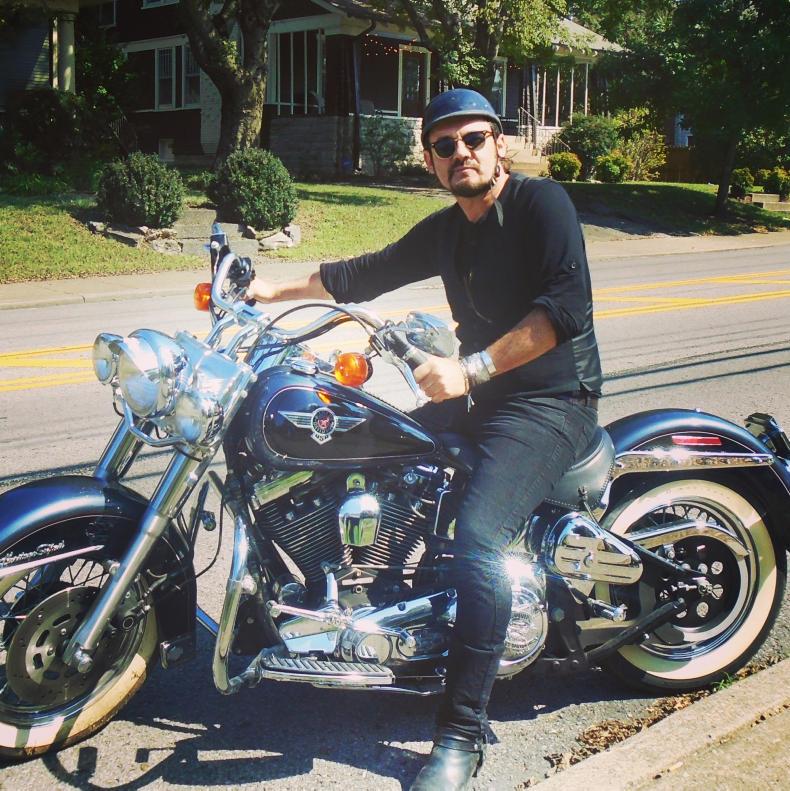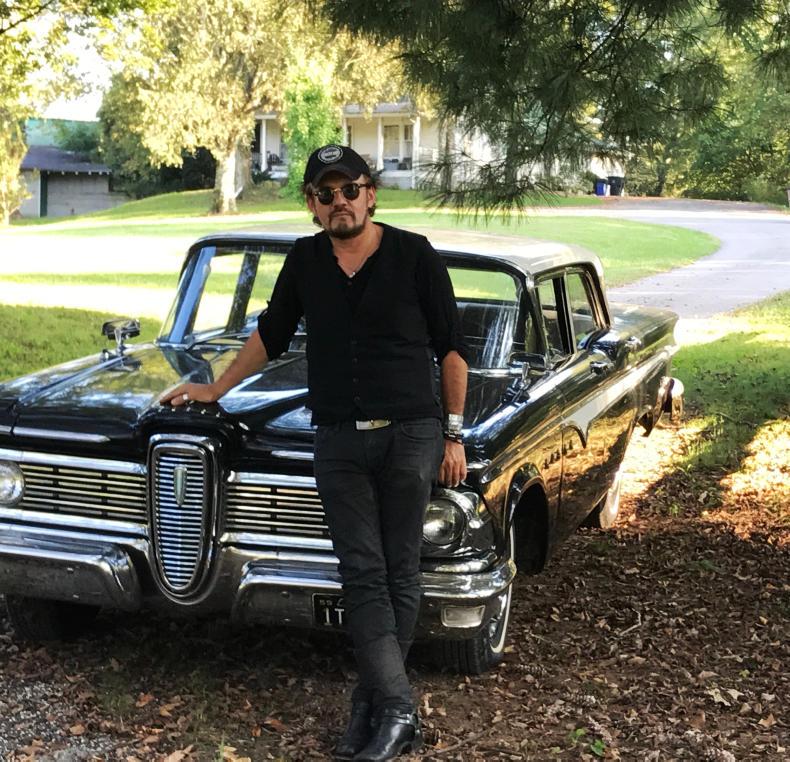Having written songs for the likes of Stella Parton, Geri Halliwell, Ronan Keating and The Backstreet Boys, it is fair to say that Don Mescall is best known as a songwriter.
However, this wasn’t always his ambition. Initially he wanted to be a singer, which he started out as, doing covers in pubs and clubs around Ireland. But Don had a lot of his own material he wanted to play, which his audience wasn’t too interested in at the time, so he decided to reinvent himself on the singer-songwriter scene in London.
“After a couple of months actually, one of the songs I had written, ironically about missing home – Road to Glory – was covered by Eleanor Shanley,” says Don. “That became a big success and was her first single after leaving De Danann.
“All of a sudden I became a songwriter. Then Richie Havens, who is one of my biggest musical heroes, covered a song of mine called Paradise and that opened the door for me in America. The whole thing really just took off. You find yourself caught up in the wave and it is very hard to get off that wave, not that I wanted to.
“Then people used to say: ‘Don Mescall the songwriter.’ It sounds funny, that is kind of what happened. You don’t even give yourself the title, it is just that people have covered your songs and they put them on records.”

Don Mescall.
Back to basics
Don has recently gone back to his singer-songwriter roots, releasing his first album in 12 years, Lighthouse Keeper. It is a duet record and on the tracks Don is joined by many of the famous names he has written for over the years, including Frances Black, Brian Kennedy, Christy Dignam and Nathan Carter.
“A lot of those people I have gotten to know really well because I have either been writing for them or with them over the years. I kind of felt that they all brought something of themselves to it. Their own kind of gifts and I was careful about what songs I asked people to sing on. I know them so well that I knew the songs they would get,” explains Don.
Lighthouse Keeper was launched before Christmas at a gig in the University Concert Hall (UCH) in Limerick. This was a hometown show for Don. Although he is primarily based in London now and lived in Nashville over the years, he is originally from Ahane, only a couple of miles down the road from UCH.
The concert received shining praise from punters and Don wasn’t the only one given a standing ovation on the night. He welcomed cervical cancer victim and campaigner Vicky Phelan, who was in the audience, from the stage and the crowd instantly rose to their feet. Don invited her on stage to speak impromptu.

Don Mescall.
Successful songs
With the success Don has achieved, Irish Country Living is keen to know what makes a good songwriter – is the ability to feel and express emotion paramount to success?
“If I was to describe myself, I am probably oversensitive,” Don reflects. “That is a drag in life in other ways. I tend to notice a lot of things, I tend to take on others’ emotions.
“When someone tells me they are going through a hard time or something is after happening, that stays with me a lot. I think what I do is store all that stuff up in some sort of hard drive in my brain. Then it comes out in a mixed-up fashion.
“I found it difficult to let go when song writing over the years because I think it is our natural protection thing not to let your emotions come out. I used to worry, especially when I would go back to Limerick, I would be singing these songs and my family would be at the gig.
“It is like hanging out your emotional laundry. I think that is a good thing because it is almost like a pressure valve emotionally – you don’t keep so much stuff and you can let it go.”
This emotional connection with writing songs helped Don through losing his father at the age of 10. He died while at a hurling match in Ahane and Don, the second youngest of 11, was with him.
“After Dad died I think I found that music became almost like my best friend in a lot of ways, I don’t want to sound too dramatic, but when you are that age and you start relating to songs, that is how I got into music.
“I found that later when I went through a difficult time in my teens that because I was able to song write, I could get rid of some of the emotions or at least put them out there. So it is kind of my best friend in a lot of ways.”
Don clearly has a way with words, which has aided him both professionally and personally. Once again, he is putting his own voice behind these words.
Read more
Only a woman
Music through the generations
Having written songs for the likes of Stella Parton, Geri Halliwell, Ronan Keating and The Backstreet Boys, it is fair to say that Don Mescall is best known as a songwriter.
However, this wasn’t always his ambition. Initially he wanted to be a singer, which he started out as, doing covers in pubs and clubs around Ireland. But Don had a lot of his own material he wanted to play, which his audience wasn’t too interested in at the time, so he decided to reinvent himself on the singer-songwriter scene in London.
“After a couple of months actually, one of the songs I had written, ironically about missing home – Road to Glory – was covered by Eleanor Shanley,” says Don. “That became a big success and was her first single after leaving De Danann.
“All of a sudden I became a songwriter. Then Richie Havens, who is one of my biggest musical heroes, covered a song of mine called Paradise and that opened the door for me in America. The whole thing really just took off. You find yourself caught up in the wave and it is very hard to get off that wave, not that I wanted to.
“Then people used to say: ‘Don Mescall the songwriter.’ It sounds funny, that is kind of what happened. You don’t even give yourself the title, it is just that people have covered your songs and they put them on records.”

Don Mescall.
Back to basics
Don has recently gone back to his singer-songwriter roots, releasing his first album in 12 years, Lighthouse Keeper. It is a duet record and on the tracks Don is joined by many of the famous names he has written for over the years, including Frances Black, Brian Kennedy, Christy Dignam and Nathan Carter.
“A lot of those people I have gotten to know really well because I have either been writing for them or with them over the years. I kind of felt that they all brought something of themselves to it. Their own kind of gifts and I was careful about what songs I asked people to sing on. I know them so well that I knew the songs they would get,” explains Don.
Lighthouse Keeper was launched before Christmas at a gig in the University Concert Hall (UCH) in Limerick. This was a hometown show for Don. Although he is primarily based in London now and lived in Nashville over the years, he is originally from Ahane, only a couple of miles down the road from UCH.
The concert received shining praise from punters and Don wasn’t the only one given a standing ovation on the night. He welcomed cervical cancer victim and campaigner Vicky Phelan, who was in the audience, from the stage and the crowd instantly rose to their feet. Don invited her on stage to speak impromptu.

Don Mescall.
Successful songs
With the success Don has achieved, Irish Country Living is keen to know what makes a good songwriter – is the ability to feel and express emotion paramount to success?
“If I was to describe myself, I am probably oversensitive,” Don reflects. “That is a drag in life in other ways. I tend to notice a lot of things, I tend to take on others’ emotions.
“When someone tells me they are going through a hard time or something is after happening, that stays with me a lot. I think what I do is store all that stuff up in some sort of hard drive in my brain. Then it comes out in a mixed-up fashion.
“I found it difficult to let go when song writing over the years because I think it is our natural protection thing not to let your emotions come out. I used to worry, especially when I would go back to Limerick, I would be singing these songs and my family would be at the gig.
“It is like hanging out your emotional laundry. I think that is a good thing because it is almost like a pressure valve emotionally – you don’t keep so much stuff and you can let it go.”
This emotional connection with writing songs helped Don through losing his father at the age of 10. He died while at a hurling match in Ahane and Don, the second youngest of 11, was with him.
“After Dad died I think I found that music became almost like my best friend in a lot of ways, I don’t want to sound too dramatic, but when you are that age and you start relating to songs, that is how I got into music.
“I found that later when I went through a difficult time in my teens that because I was able to song write, I could get rid of some of the emotions or at least put them out there. So it is kind of my best friend in a lot of ways.”
Don clearly has a way with words, which has aided him both professionally and personally. Once again, he is putting his own voice behind these words.
Read more
Only a woman
Music through the generations











SHARING OPTIONS